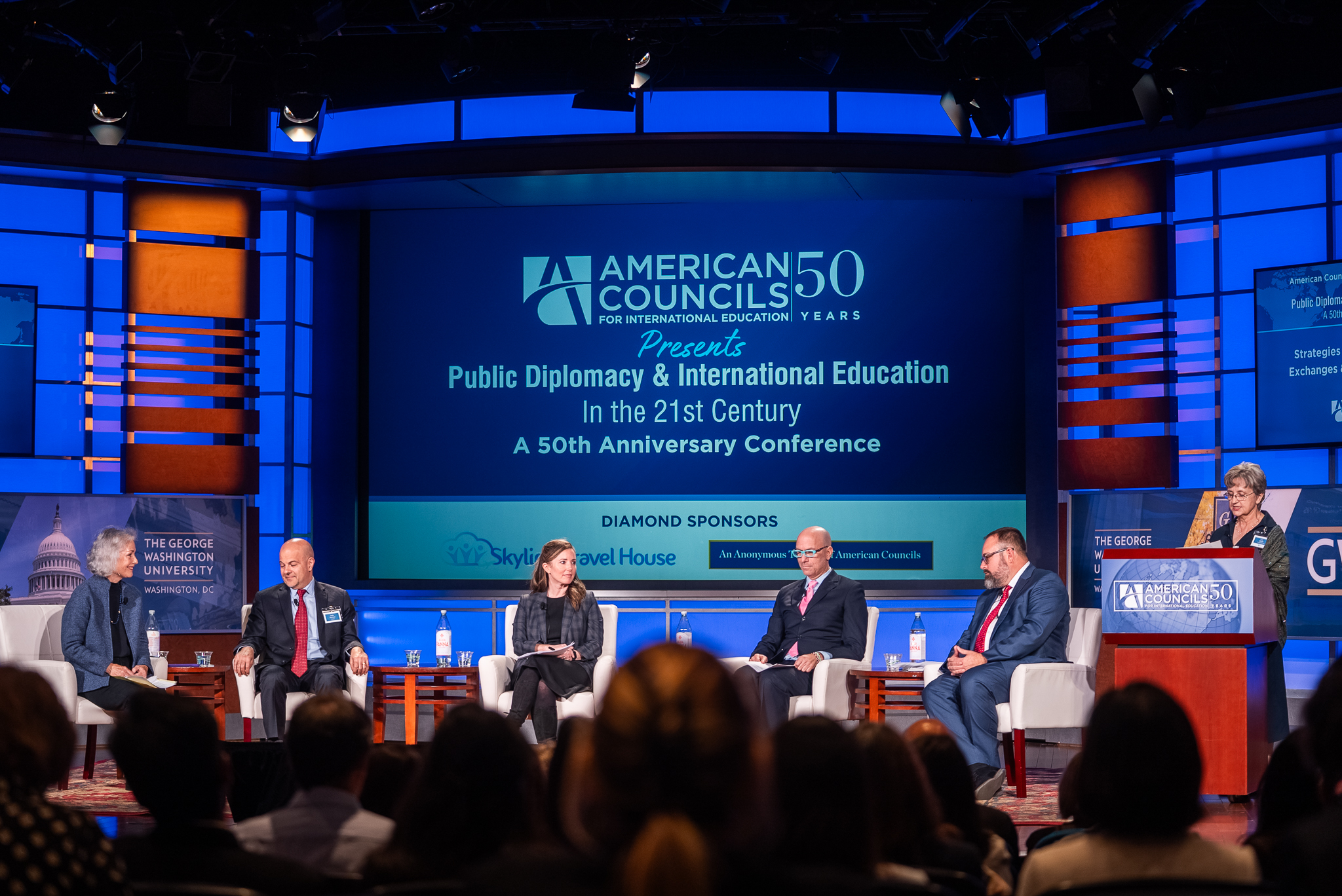October 17, 2024, Washington, DC — American Councils for International Education marked a major milestone, celebrating 50 years of global impact with its anniversary conference, “Public Diplomacy and International Education in the 21st Century.” Held at the Jack Morton Auditorium, the conference was co-hosted by George Washington University’s School of Media and Public Affairs, the Institute for Public Diplomacy and Global Communication, and the Institute for Data, Democracy, and Politics. The event brought together American Councils’ partners, staff, volunteers, and alumni, with virtual access available for international staff and alumni worldwide.
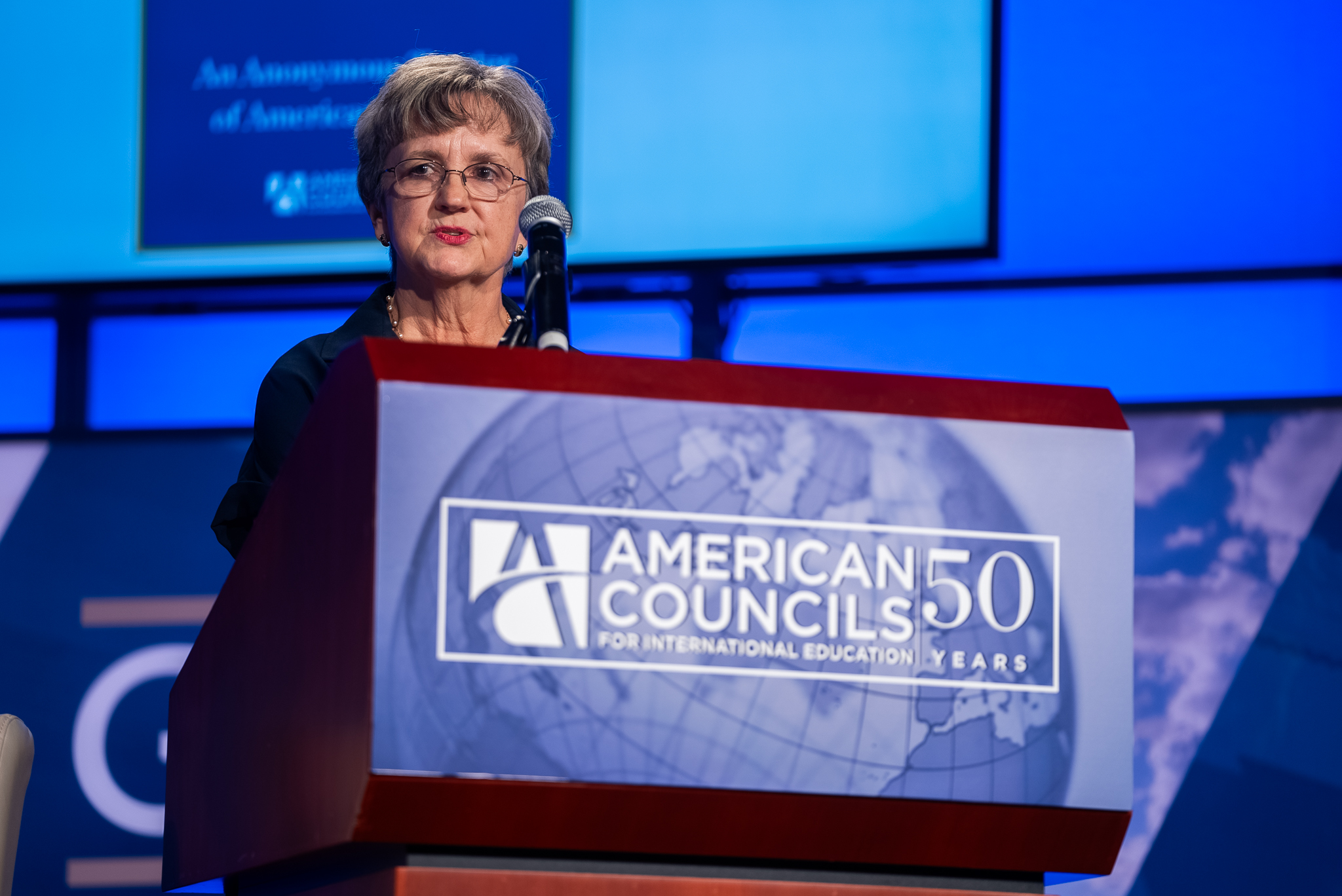 Speakers included diplomatic, government, business, and academic thought leaders who discussed the transformative power of international education. Ms. Lisa Choate, President and CEO of American Councils, opened the event with reflections on the organization’s history and mission, highlighting its role in fostering dialogue between the U.S. and the Soviet Union during the Cold War through academic partnerships and people-to-people exchanges.
Speakers included diplomatic, government, business, and academic thought leaders who discussed the transformative power of international education. Ms. Lisa Choate, President and CEO of American Councils, opened the event with reflections on the organization’s history and mission, highlighting its role in fostering dialogue between the U.S. and the Soviet Union during the Cold War through academic partnerships and people-to-people exchanges.
Ms. Choate, an alumna of the American Councils’ Advanced Russian Language and Area Studies Program (RLASP), shared insights into international exchange's personal and societal value. “The goal is to provide a rich experience, one that fuels individuals and institutions open to learning, reconciling their prior knowledge with new perspectives.”
The conference honored American Councils impact as a leading administrator of long- and short-term international academic exchange and language training programs, which includes a portfolio of over 250 educational, professional development and research programs in 140 countries supported by over 30 overseas offices and 650 professional staff members worldwide. The impact of American Councils resonates through its expansive global community of over 100,000 alumni, many of whom occupy prominent positions in public life and academia, including as heads of state, members of parliament, distinguished academics, ambassadors, CEOs and business innovators, and top international educators.
Keynote Address
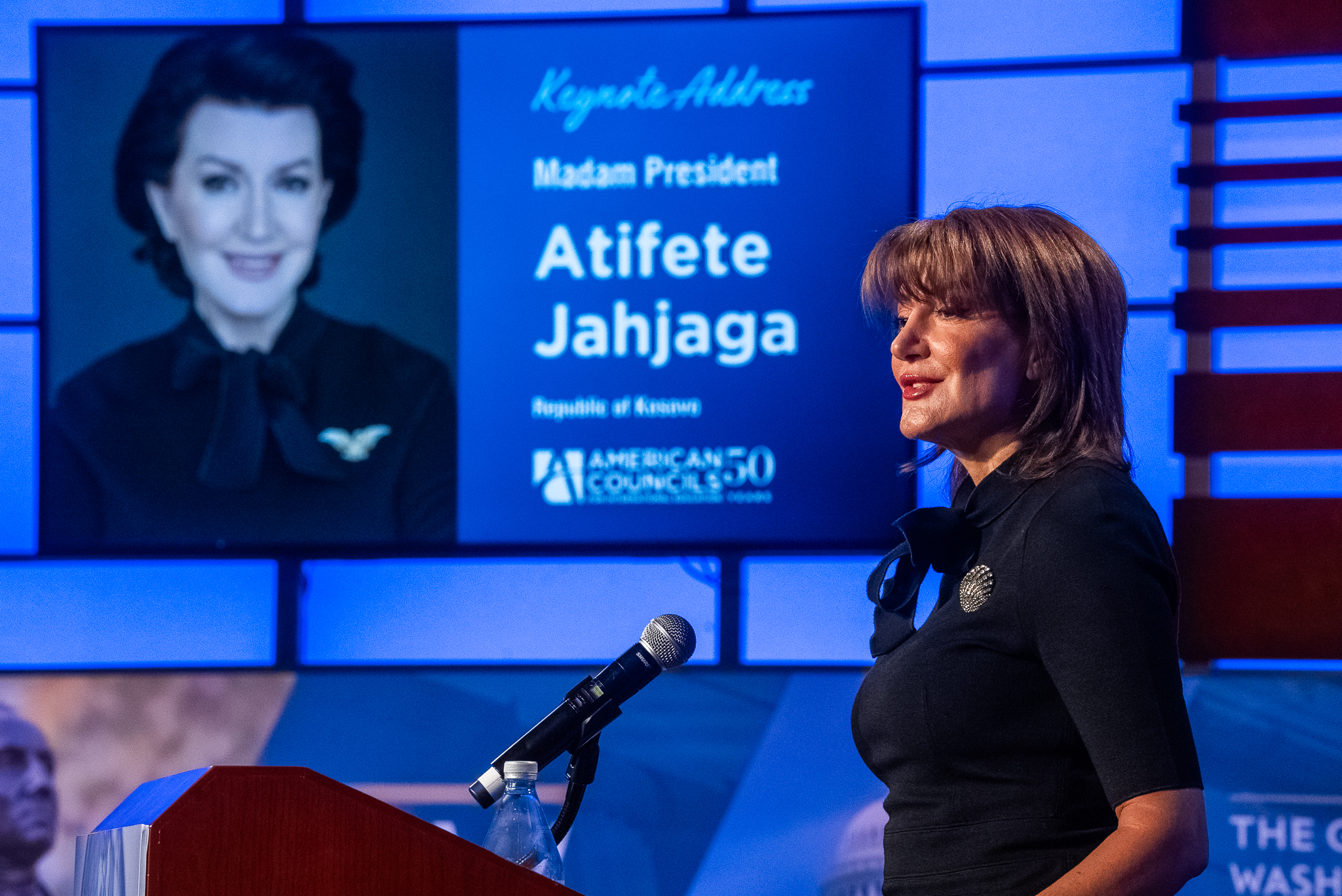
Madam President Atifete Jahjaga, former President of the Republic of Kosova and founder of the Jahjaga Foundation, delivered an inspiring keynote address, expressing gratitude to American Councils and the United States for their commitment to Kosova’s progress.
Highlighting the unique potential of public diplomacy, President Jahjaga remarked, “Unlike traditional diplomacy, which happens behind closed doors, public diplomacy thrives in the open, inviting the participation of all sectors of society.” She shared examples of how public diplomacy and international education have contributed tangibly to Kosova’s development.
Strategies for the U.S. to Enhance Exchanges and People-to-People Exchanges
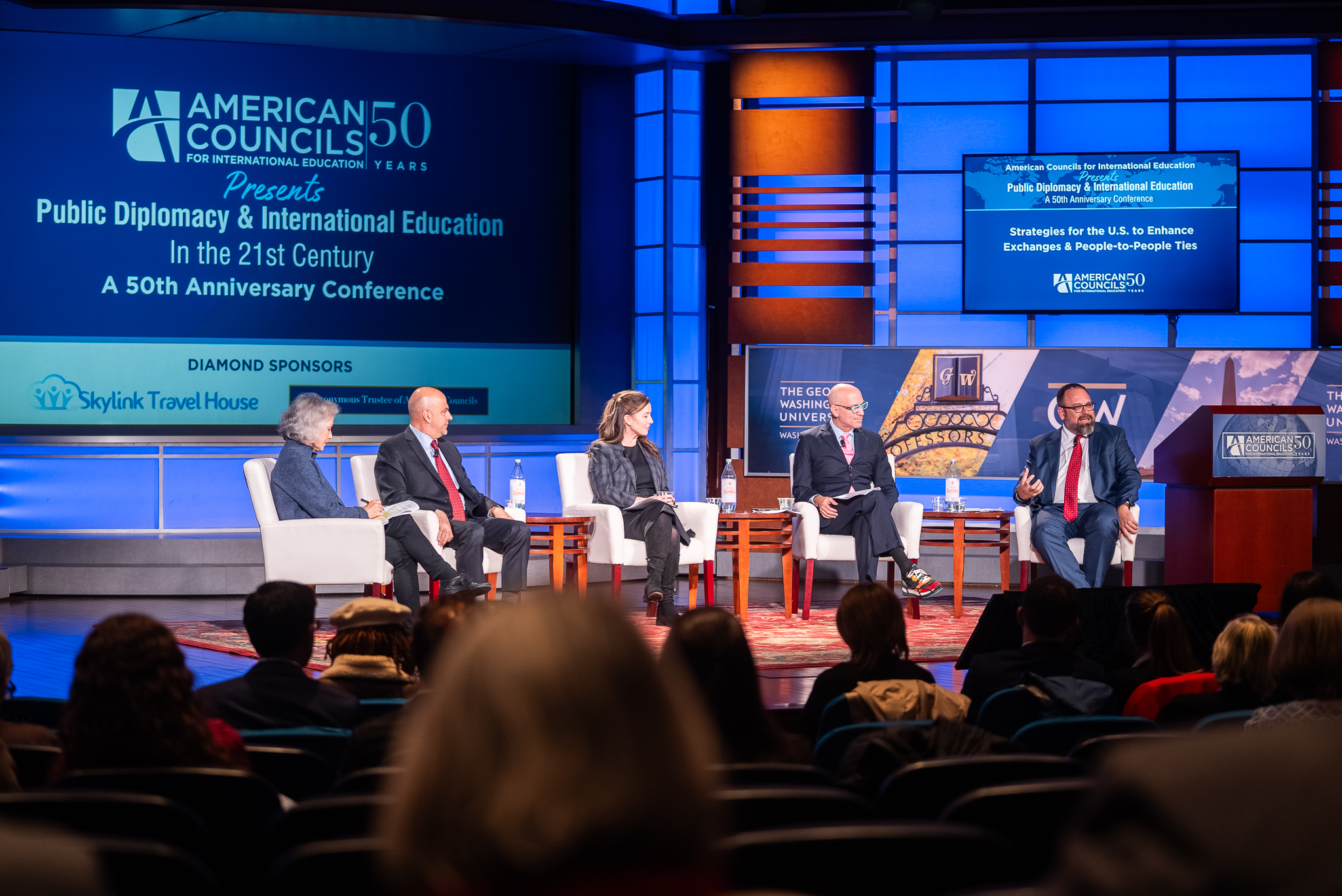
The first panel explored the future of international exchange programs in a connected yet polarized world. Moderated by Ambassador Marie Yovanovitch, former ambassador to Ukraine, the panel featured Mr. Rafik Mansour, Deputy Assistant Secretary for Policy at the U.S. Department of State Bureau of Educational and Cultural Affairs (ECA), Dr. Katherine A. Brown, President and CEO of Global Ties U.S., Mr. Joe Kapp, President of the Center for Resource Development (NCRD), and Mr. Joe Wierichs, Public Diplomacy Fellow at George Washington University’s Institute for Public Diplomacy and Global Communication.
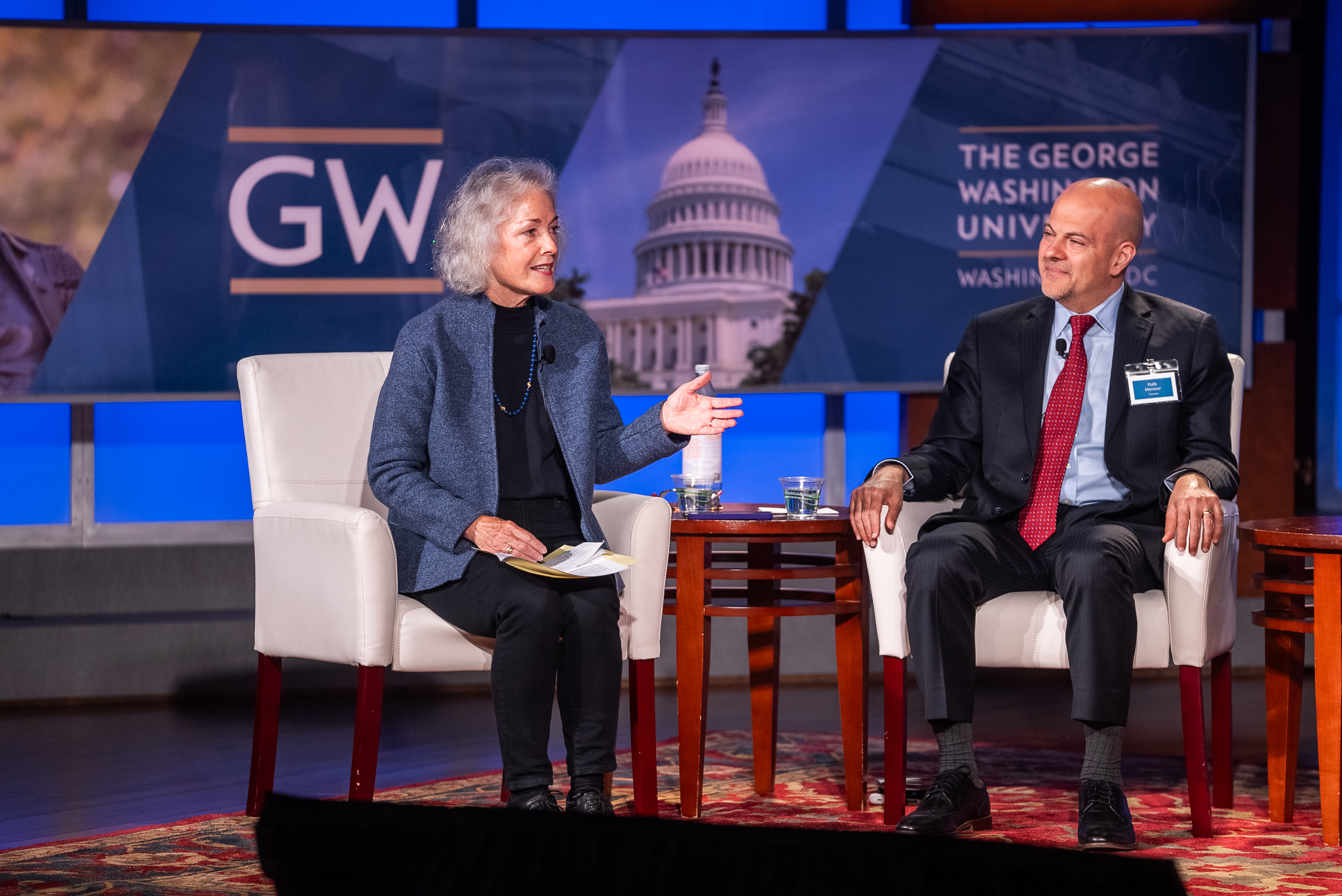
Ambassador Yovanovitch recounted how her father’s membership in the American Council of Teachers of Russian (ACTR), the organization that evolved into American Councils for International Education, introduced her to international relations. She recalled receiving ACTR’s monthly leaflets, remarking, “Those letters signified to me that there was a whole big world out there that was going to be calling to me.”
The panel discussed the critical role of U.S. "soft power" –encompassing pop culture, sports, and, most importantly, people-to-people exchanges—in maintaining strong global relationships. Mr. Mansour described the ECA as the “soft power arm of the U.S.,” with over 100 programs supporting this mission globally. Dr. Brown emphasized the impact of programs like the International Visitor Leadership Program (IVLP) in building relationships between U.S. communities and international leaders. Mr. Kapp highlighted the global business networks emerging from public diplomacy programs like the Uzbekistan Business Leaders (UBL) program.
The Crucial Role of Languages & Area Studies in Maintaining Strong International Ties
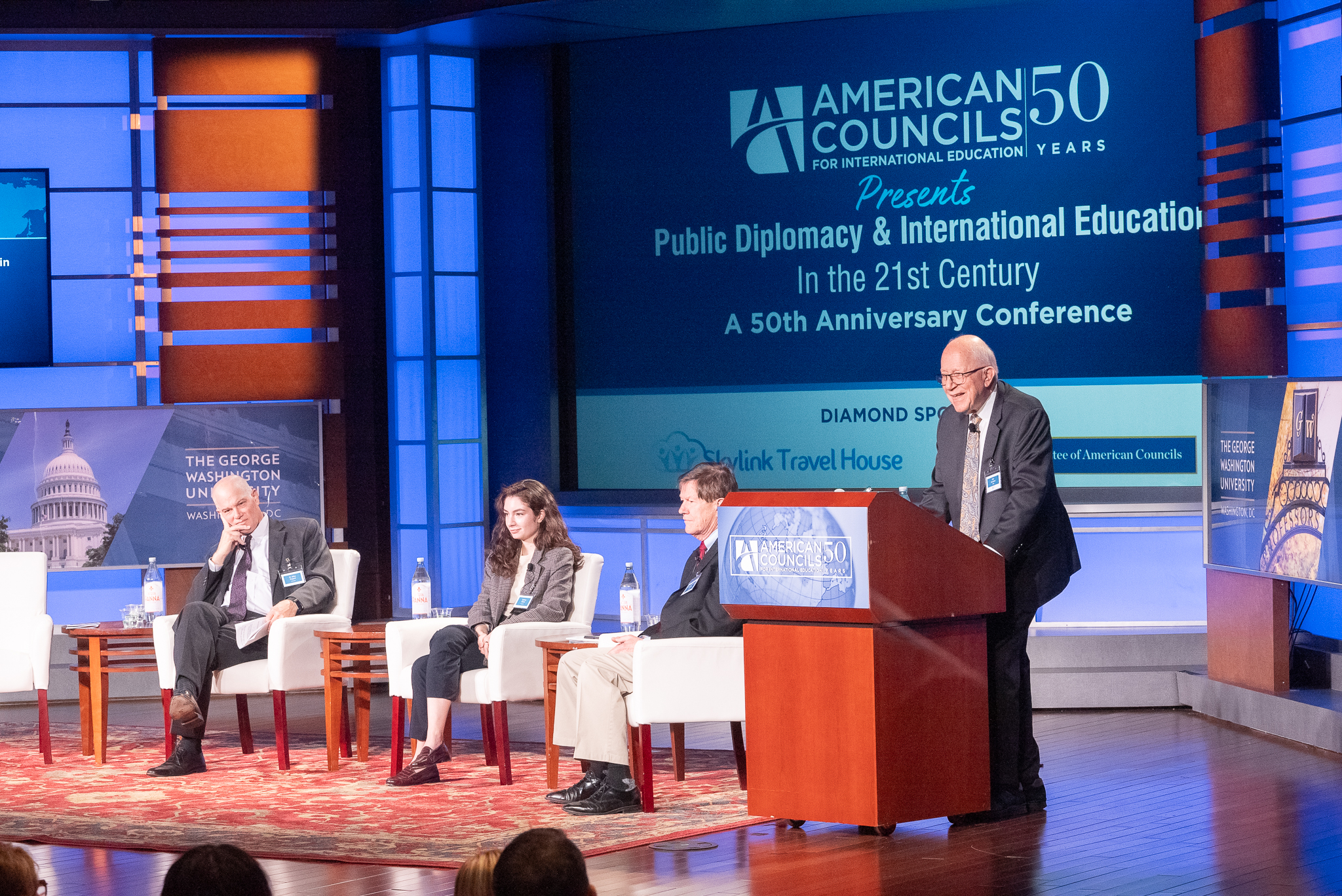
The second panel featured Dr. Dan E. Davidson, President Emeritus and Co-Founder of American Councils, Dr. Mike Nugent, former Director of the National Security Education Program, Dr. Betty Lou Leaver, former Provost of the Defense Language Institute, Ambassador John Ordway, former ambassador to Armenia and Kazakhstan, and Ms. Sydney Stotter, a PhD candidate at Harvard University and alumna of several American Councils programs.
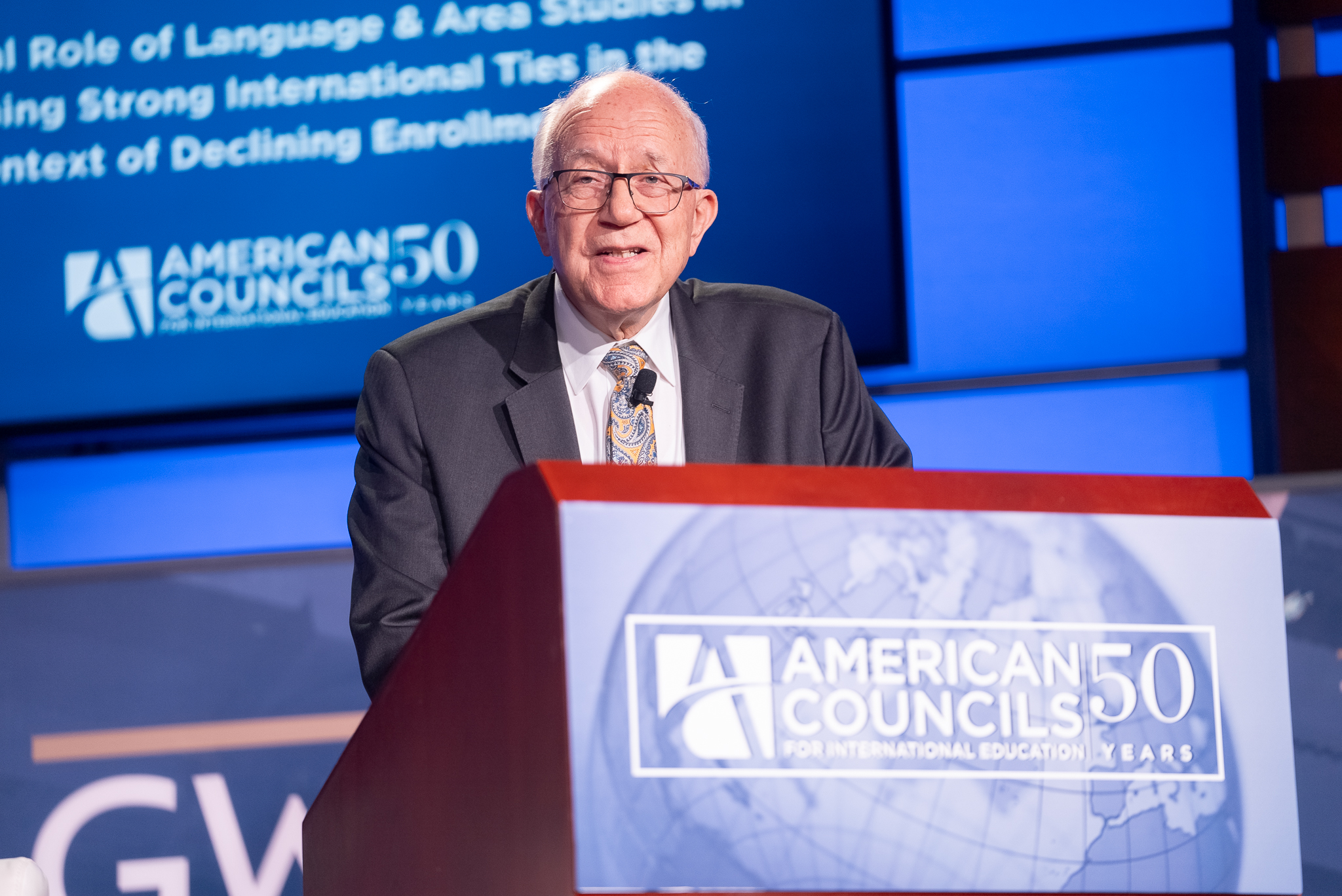
Dr. Davidson reflected on American Councils' mission to equip U.S. citizens with the skills necessary to address global challenges through extensive overseas language and cultural immersion programs. “American Councils is honored to have contributed over the past 50 years to somehow, to some degree, strengthening U.S. capacity in international affairs through the preparation of successive generations of American citizens with high levels of competencies in the world’s critical languages and cultures,” said Dr. Davidson.
Dr. Nugent praised American Councils for preparing U.S. citizens to apply their language skills in professional settings. Ms. Stotter shared the impact of her study abroad experiences. Dr. Leaver discussed the LREC (Language, Regional Expertise, and Culture) framework, noting, “Transformed learners do not abandon their own culture but blend it into a deep understanding and acceptance of their new culture.” Ambassador Ordway shared how his language skills have enabled him to mediate conflicts, communicate U.S. interests, and build connections.
Media and the Challenges Posed to Public Diplomacy
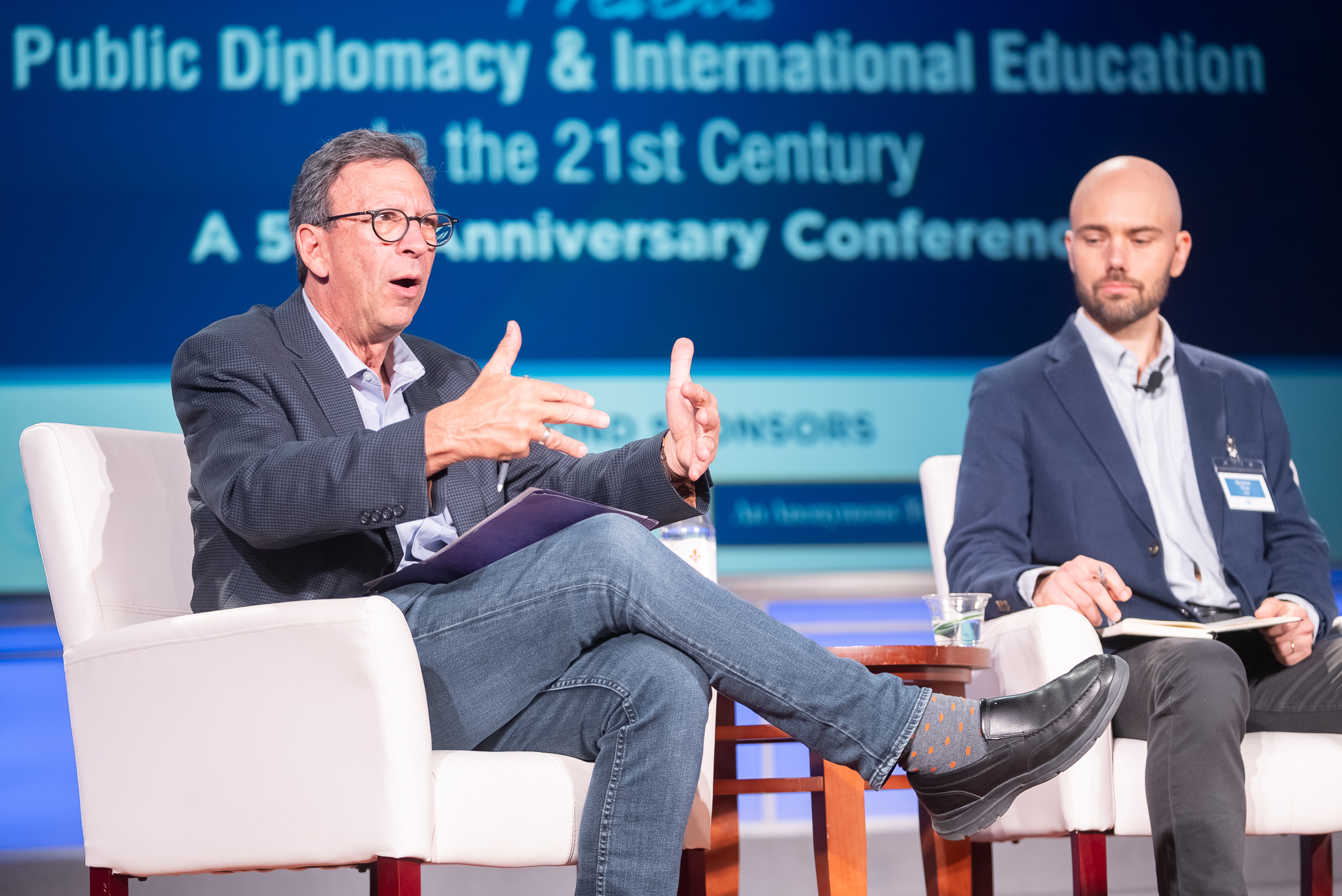
The conference concluded with a panel on media and its implications for public diplomacy. Moderated by Mr. Frank Sesno, Emmy-winning journalist and Director of Strategic Initiatives at George Washington University, the discussion featured Mr. Benjamin Thurn, Program Manager of Virtual Programs at American Councils, Dr. Ethan Porter, Associate Professor of Media & Public Affairs and Political Science at George Washington University, and Dr. Sumitra Badrinathan, Assistant Professor of Politics, Governance, and Economics at American University.
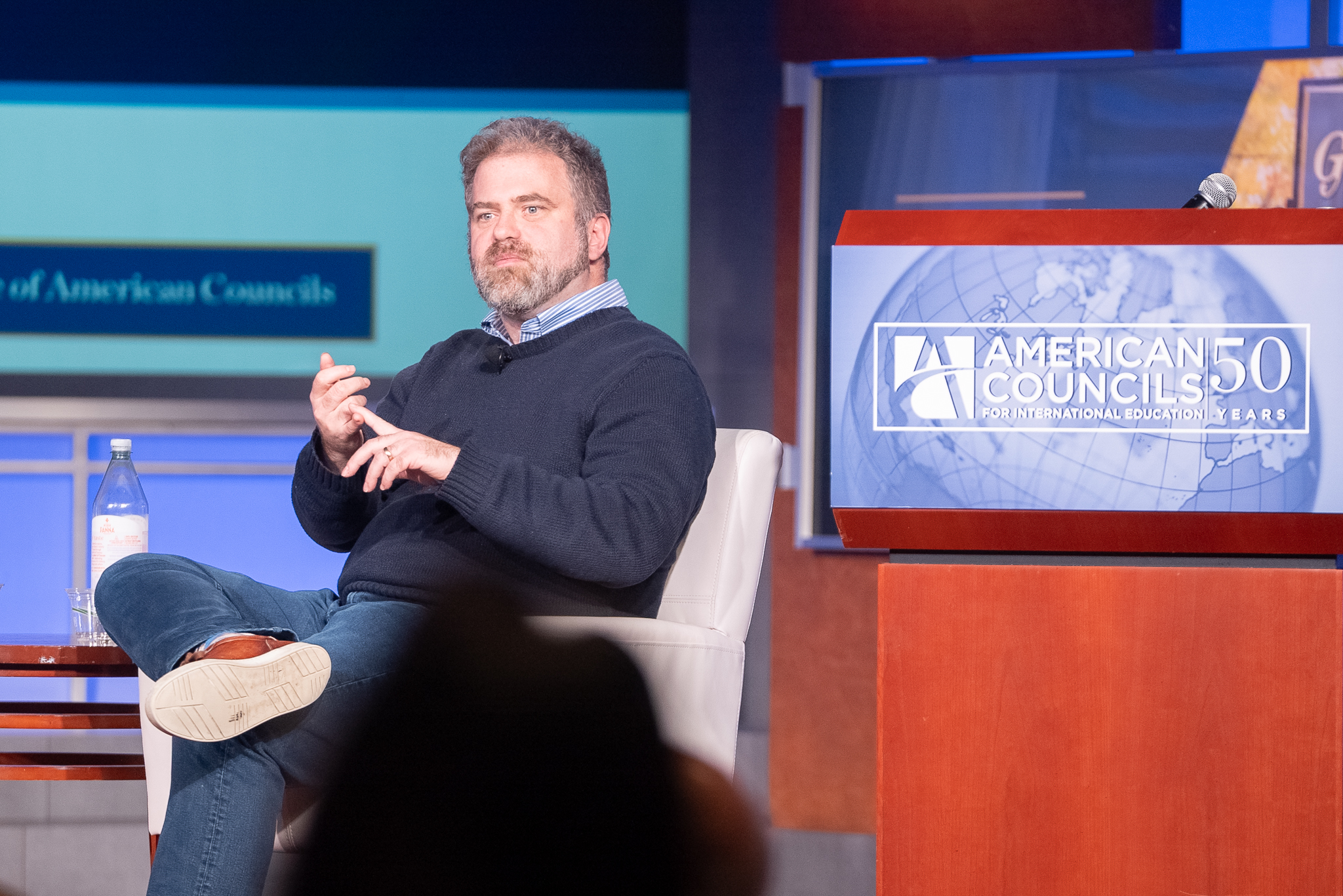
Mr. Sesno discussed the challenges diplomacy practitioners face while navigating relationships in regions impacted by false information. Dr. Porter highlighted the importance of digital literacy in discerning fact from fiction as technology enhances the scalability of false information.
Mr. Sesno closed by noting the unprecedented access today’s youth have to information and audiences, questioning how public diplomacy can harness this for constructive outcomes. Mr. Thurn emphasized that while digital media enables global idea-sharing, its potential must be supported by strong media skills to foster a more informed and discerning public.
Thank You for Being Part of Our World
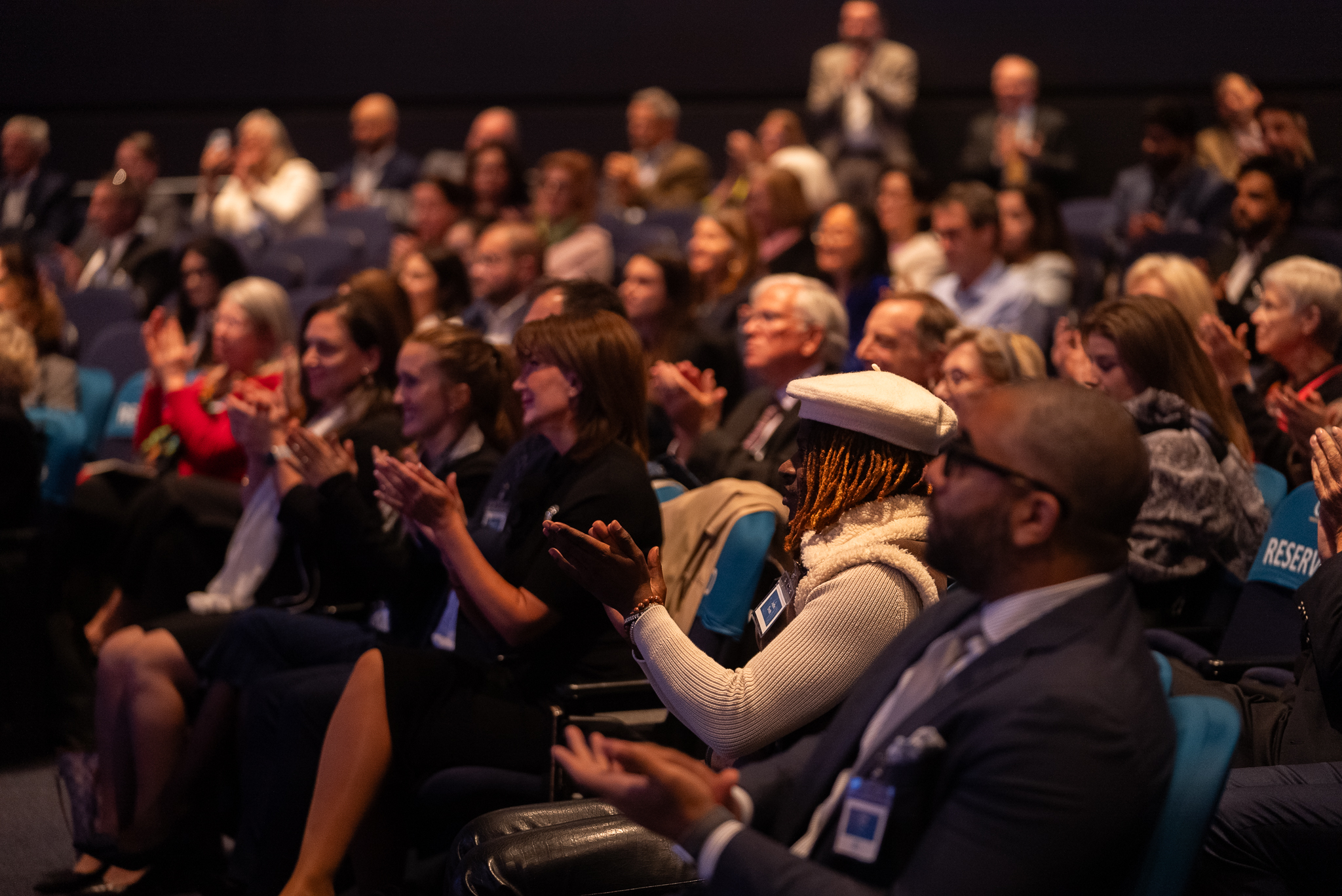
American Councils extends heartfelt gratitude to the individuals and organizations whose generosity makes this work possible. Special thanks to the dedicated staff, board of trustees, and volunteers who support our mission and our participants. Deep appreciation is also extended to the conference sponsors. Their sponsorships directly benefit American Councils’ flagship scholarships—the Dan E. Davidson Fellowship and the David P. Patton Distinguished Alumni Award.
As American Councils commemorates 50 years, it reaffirms its commitment to shaping a more interconnected and peaceful world through excellence in academic, professional, and cultural exchange, language acquisition, educational development, and research. Please join us in celebrating our past and the next 50 years of international collaboration.
Stay connected with American Councils by subscribing to our monthly newsletter.

